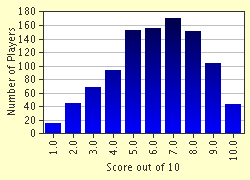Quiz Answer Key and Fun Facts
1. These four characters from Shakespeare's "Troilus and Cressida" had earlier appeared in Greek mythology as well as Homer's "Odyssey" and Virgil's "Aeneid". Each has achieved an eponymous immortality of some kind or other. In Shakespeare's play, one of them acts as a go-between for the ill-starred lovers with the result that his name has become infamous as a rather seedy procurer or pimp. Who is he?
2. This name for a wanton seducer of women originated as a character in Nicholas Rowe's 1703 play "The Fair Penitent".
3. A comical female character in R.B. Sheridan's 1775 play "The Rivals" is the origin of this word, which describes the use of a word or words in a phrase which are comically inappropriate, although they sound approximately like the correct words.
4. All but one of the following literary characters has become synonymous with an individual who hypocritically conceals an unscrupulous and corrupt nature behind a facade of false humility and/or piety. The fourth is a rather nice fellow who conceals a hyperactive fantasy life behind a meek facade; which one is he?
5. Jonathan Swift's immortal novel "Gulliver's Travels" is the source of a number of eponymous terms. Which of these is NOT derived from characters (actually races of people) in Swift's novel, but from a legendary character who features in a work by the 16th century French author Francois Rabelais?
6. The word "Svengali", which describes an exacting and rather sadistic taskmaster who transforms someone with raw talent into a great artist, is derived from the name of the title character of an 1894 George du Maurier novel.
7. These two characters were featured in Victorian-era author Pierce Egan's 1821 book "Life in London", the first in what would become an extremely popular series. Their adventures were eventually adapted into a play by William T. Moncrieff. An eggnog-like drink laced with rum, usually served around the Christmas holidays, bears their name(s). More recently, their names were appropriated for an American children's cartoon duo. Who are they?
8. American author Eleanor Porter's hugely popular 1914 novel "Pollyanna" featured, as its title heroine, an indefatigably (some might say insufferably) cheerful and optimistic young orphan girl, whose "find the silver lining" philosophy eventually transforms virtually everyone she encounters. The term "Pollyanna" has since become synonymous with any incurable optimist. Miss Porter's heroine, however, has a much earlier male counterpart in this character from 18th century French literature, whose eponymous philosophy holds that "All is for the best in this best of all possible worlds." Who is he?
9. The name of the title character of this Sinclair Lewis novel has entered the vocabulary as a self-satisfied hypocrite and mediocrity who, nonetheless, enjoys material success and respectability. This type was as well-known in Lewis' day as it is today. What is the novel?
10. The novels of Charles Dickens are notable for their proliferation of vividly drawn characters, many of whose names have passed into usage in the English language (Scrooge being a classic example). One of the most striking examples is this character from one of Dickens' earliest novels, who is the head of an adventurous and benevolent club which bears his name. He typifies a type of well-meaning, if somewhat bumbling, benevolence; also, a type of disclaimer once popular with lawyers and politicians also bears his name. Who is he?
Source: Author
jouen58
This quiz was reviewed by FunTrivia editor
agony before going online.
Any errors found in FunTrivia content are routinely corrected through our feedback system.

